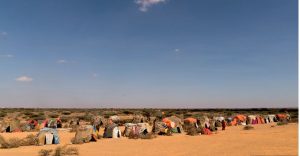Unprecedented famine crisis looms
The global refugee crisis is set to worsen as dire humanitarian crises emerge in Africa and Asia – affecting some of the poorest people in the world.
South Sudan, Nigeria, Somalia, Yemen and Sri Lanka are all facing famine situations as drought and conflict disrupt food and water supplies.
 The United Nations says it needs more than $US4 billion by the end of next month to prevent “a catastrophe” of hunger and famine in these countries.
The United Nations says it needs more than $US4 billion by the end of next month to prevent “a catastrophe” of hunger and famine in these countries.
More than 20 million people face starvation in these countries and action is needed now to avert a humanitarian disaster, according to UN Secretary-General Antonio Guterres, who was formerly the head of the UNHCR.
“We need $4.4 billion by the end of March to avert a catastrophe,” he said.
So far, the UN has raised just $90 million.
South Sudan has declared famine in northern Unity State while Fews Net, the famine early warning system, has said that some remote areas of northeast Nigeria are already affected by starvation since late last year.
The large number of famine alerts is unprecedented in recent decades.
There has only been one famine since 2000, in Somalia. At least 260,000 people died in that disaster – half of them children under the age of five, according to the UN World Food Programme.
The UN children’s agency UNICEF this week said almost 1.4 million children acutely malnourished in Nigeria, Somalia, South Sudan and Yemen could die from famine in the coming months.
Of the five famine alerts, only two – in Somalia and Sri Lanka – are caused by drought, while the other three are the result of conflicts, also described as “man-made food crises”.
“The situation is dire,” Mr Guterres said.
“Millions of people are barely surviving in the space between malnutrition and death, vulnerable to diseases and outbreaks, forced to kill their animals for food and eat the grain they saved for next year’s seeds,” he said.
The appeal for international action came as humanitarian aid groups are already struggling to meet needs in Syria and cope with the global refugee crisis.
The drought in Somalia is so severe it threatens not only to trigger famine, but also the viability of the age-old pastoralist way of life.
The drought is expected to worsen in the coming months. That does not bode well when half of all Somalis – 6.2 million people – are already short of food or in need of livelihood support.
“This drought has caused big shifts in demographics, with more people realising that they cannot sustain this lifestyle that is essentially weather-dependent,” said Michael Keating, special representative of the UN secretary-general.
“There are more people moving into urban areas than ever before,” he noted. These fresh influxes are adding to large numbers of already vulnerable IDPs, uprooted by Somalia’s more than two decades of instability.
Throughout Puntland and Somaliland, NGOs are working to support displaced pastoralists as well as host communities.
In Sri Lanka, close to one million people are in “urgent need of food assistance” with tens of thousands needing “life-saving support”, according to an assessment by the government and the UN.
Sri Lanka has been dealing with its worst drought in decades over the past year, and people are reaching the breaking point.
In a recent report, the nation’s Disaster Management Centre cited 1.2 million people “affected” by the drought.
“Over 900,000 people are in urgent need of food assistance,” the report said. Of those, about 80,000 people need “urgent life-saving support”.
The drought is affecting 23 of the island nation’s 25 districts, across all nine provinces.
Already, many families are being forced to “eat less preferred food, limit portion sizes, reduce number of meals per day,” the report said.
“Irreversible coping strategies such as taking children out of school and selling of livelihood assets could be further increased as a result of the exhausted nature of food consumption based coping strategies,” the report warned.
Yemen is the worst affected country with the UN describing it as being “on the brink of famine”.
More than 7.3 million people urgently need food assistance and more than 460,000 children are suffering from severe acute malnutrition.
The starvation in Yemen stems from two years of war that has maimed and killed thousands of civilians.
A Saudi led coalition has been bombing the country since March 2015 to try and get rid of Iranian aligned Houthi rebels who overthrew the Government.
The coalition has enforced a blockade on the poverty stricken country, which is 90 per cent dependent on food imports.
There are now indications food security in Yemen is about to get much worse.
A move by the Saudi coalition to stop aid coming through Hudaydah Port, Yemen’s main port, could have potentially devastating effects.
Critical food supplies for the millions of Yemenis at risk of starvation will now have to be shipped to the smaller southern port of Aden and trucked up to Sanaa and other northern towns, crossing through areas of fighting and warring party lines.
Laurie Nowell
AMES Australia Senior Journalist












